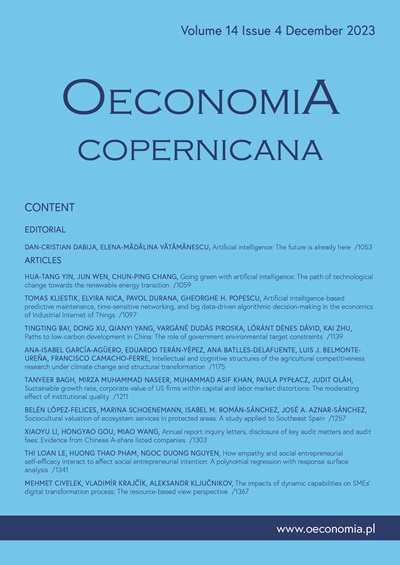Digital transformation and corporate cash holdings in China's A-share listed companies
IF 7.6
1区 经济学
Q1 ECONOMICS
引用次数: 9
Abstract
Research background: In the digital era, digital transformation has become a strategic imperative for leadership agenda. Many firms have accelerated their pace in digital transformation to improve their performance and competitiveness. Despite increasing attention in the literature on the role of digital transformation in firms? operations, understanding the effect of digital transformation on corporate finance remains limited. This study focuses on cash holdings, which are essential for firms to survive and thrive. Purpose of the article: The aim of this paper is to examine the critical role of digital transformation on the cash holdings of listed firms in China and provide micro evidence regarding the economic consequences of the digital economy from firm level. This study also aims to deepen our understanding of the influence of digital transformation on firms? operation and financial policy. Additionally, this paper attempts to provide relevant guidance for implementing policies to promote digital transformation and devise corresponding cash holding strategies. Methods: The text analysis method is used to measure the degree of digital transformation of China?s A-share listed companies. The sample covers 19,337 observations from 2007?2020. A multiple regression model with firm and year fixed effect is developed to investigate the relationship between digital transformation and corporate cash holdings. In the robustness test, this paper substitutes the independent and dependent variables, and adopts instrumental variable estimation method. In the mechanism test, this paper uses the sub-sample regression method in the mechanism test. Findings & value added: This study reveals that digital transformation can significantly reduce corporate cash holdings by alleviating the precautionary motive, agency motive and transaction motive of cash holdings. Further analysis shows that the negative effect of digital transformation on cash holdings is more profound in high-tech firms and non-state-owned enterprises. The methodology applied in this paper can be used in other economic research of firms. This study provides insights into the effects of digital transformation on corporate financial policy. This provides a solution for reducing firms? cash holdings. This study also deepens the understanding of digital transformation from a corporate perspective.中国a股上市公司的数字化转型与企业现金持有量
研究背景:在数字化时代,数字化转型已成为领导议程的战略要求。许多公司加快了数字化转型的步伐,以提高业绩和竞争力。尽管越来越多的文献关注数字化转型在企业中的作用?运营方面,对数字化转型对企业财务影响的理解仍然有限。本研究的重点是现金持有,这是企业生存和发展的必要条件。文章的目的:本文的目的是研究数字化转型对中国上市公司现金持有量的关键作用,并从企业层面为数字经济的经济后果提供微观证据。本研究还旨在加深我们对数字化转型对企业影响的理解。经营和财务政策。此外,本文试图为实施促进数字化转型的政策提供相关指导,并制定相应的现金持有策略。方法:采用文本分析法对中国数字化转型程度进行测度。a股上市公司。该样本涵盖了从2007年到2020年的19337次观测。建立了具有企业固定效应和年固定效应的多元回归模型,探讨了数字化转型与企业现金持有量之间的关系。在稳健性检验中,本文替代了自变量和因变量,采用工具变量估计方法。在机理试验中,本文采用了子样本回归方法进行机理试验。研究结果与增加值:研究发现,数字化转型可以通过缓解现金持有的预防性动机、代理动机和交易动机显著降低企业现金持有。进一步分析表明,数字化转型对现金持有量的负面影响在高新技术企业和非国有企业更为深刻。本文所采用的方法可用于其他企业经济研究。本研究深入探讨了数字化转型对企业财务政策的影响。这为减少公司数量提供了一个解决方案。现金持有量。本研究也加深了从企业角度对数字化转型的理解。
本文章由计算机程序翻译,如有差异,请以英文原文为准。
求助全文
约1分钟内获得全文
求助全文
来源期刊

Oeconomia Copernicana
ECONOMICS-
CiteScore
13.70
自引率
5.90%
发文量
26
审稿时长
24 weeks
期刊介绍:
The Oeconomia Copernicana is an academic quarterly journal aimed at academicians, economic policymakers, and students studying finance, accounting, management, and economics. It publishes academic articles on contemporary issues in economics, finance, banking, accounting, and management from various research perspectives. The journal's mission is to publish advanced theoretical and empirical research that contributes to the development of these disciplines and has practical relevance. The journal encourages the use of various research methods, including falsification of conventional understanding, theory building through inductive or qualitative research, first empirical testing of theories, meta-analysis with theoretical implications, constructive replication, and a combination of qualitative, quantitative, field, laboratory, and meta-analytic approaches. While the journal prioritizes comprehensive manuscripts that include methodological-based theoretical and empirical research with implications for policymaking, it also welcomes submissions focused solely on theory or methodology.
 求助内容:
求助内容: 应助结果提醒方式:
应助结果提醒方式:


